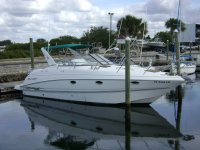I had an Mercruiser I/O in salt water for 15 years. I have had OBs in salt water for 20 years, so I have some experience. Cast Iron I/O engine blocks hold up very well to saltwater, but the stamped steel parts do not. So rust forms on pulleys, ring gear covers etc. It is best to hose the blocks down regularly. I would normally find pieces of unknown metal in the bilge in the spring.
Also grease the steering rod, so it doesn't seize in the tube. Be prepared to replace risers and manifolds every 7-8 years. The thermostat housings occasionally rust out as well. Oil pressure senders can rust out, as some are steel.
You will need to change thermostats, waterpumps and fan belts, whenever they fail. Alternators get corroded and fail. Starters tend to fail also, but I am not sure why. Watch for oil pans to rust out. If you scratch the paint on an oil filter, it will rust thru.
As for the outdrive. They are not as robust as OB gearcases. due to the extra gears. Keep 'em filled with good gear oil and keep the grease fittings lubes. The U joints will fail after 7-8 years or so. The yoke can get a wear groove and leak gear oil into the bilge.
I used to go thru 2 sets of anodes a year, even though I did not have shore power and I did have a MerCathodsystem. Likely the SS prop had something to do with it.
As was said, I/O are much better on fuel than 2 cycle Carb OBs, but need much more maintenance. I expect that 4 cycle OBs will eventually kill off the I/O motors. They are just as powerful, just as fuel efficient, weigh much less, but currently cost more. They also have much less maintenance requirements. Just my .02




















